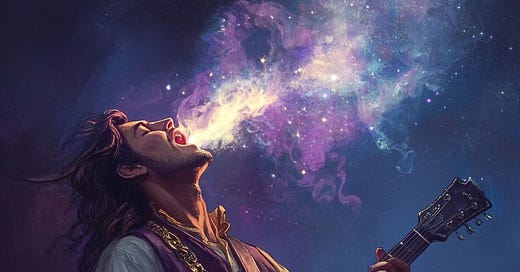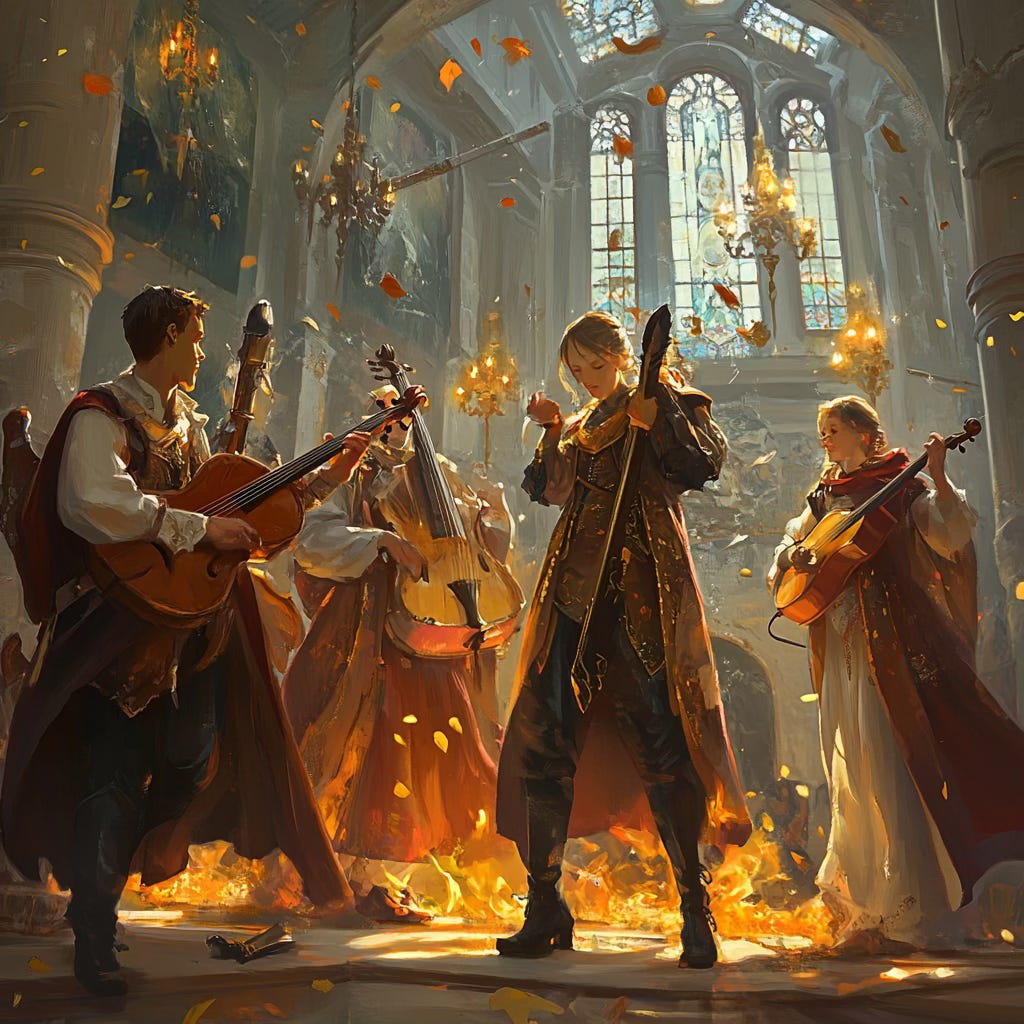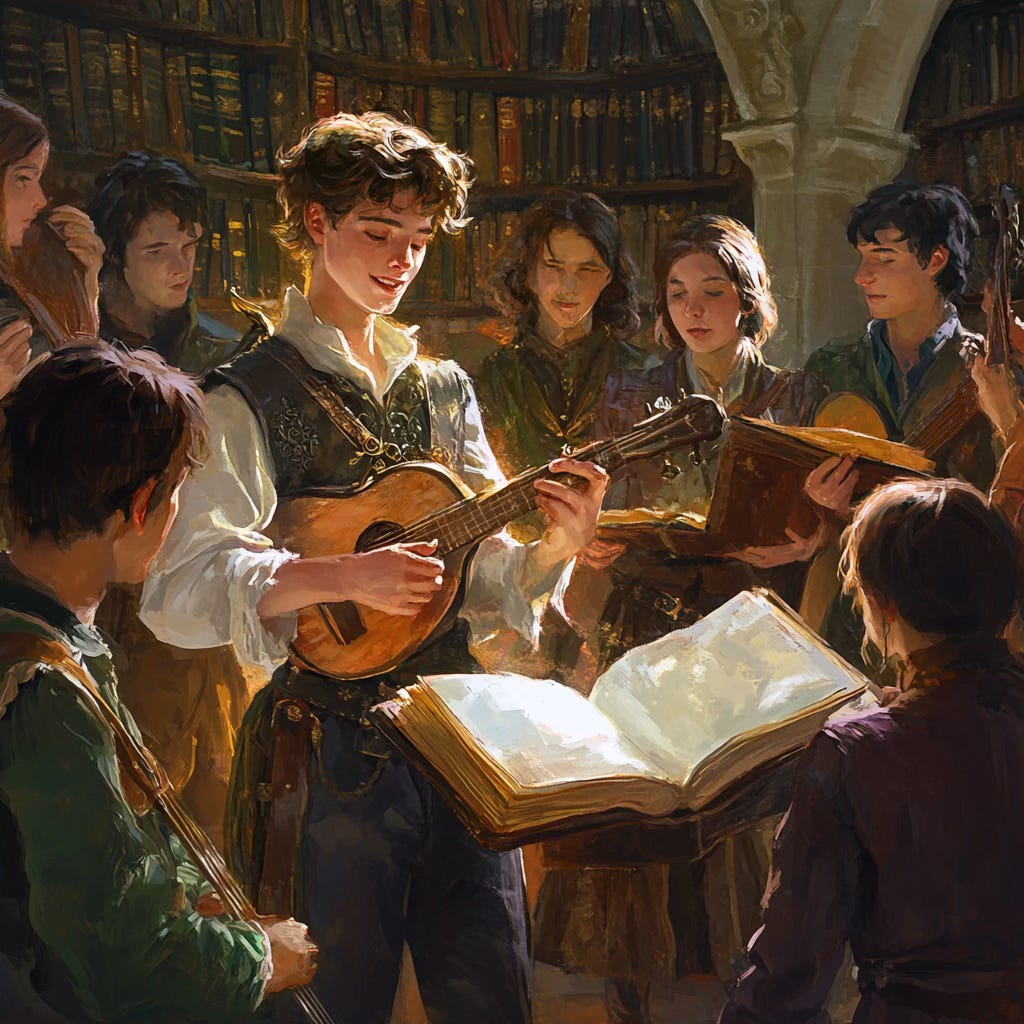Muses’ War: Overture of Shadow – The Official Soundtrack
Music for a World Where Creation Is Power
gives you a musical sample of the world of Muse’s War.
Fantasy novels often come with maps, but I’ve always thought stories—especially stories about artists—also need soundtracks. Muses’ War: Overture of Shadow is a tale about magic, yes—but more than that, it’s a story about music, inspiration, sacrifice, and the power of art to both uplift and destroy. Music isn’t just flavor in this world. It’s the soul of it.
Below is a curated playlist of pieces that reflect the emotional arc of the novel, the tonal character of its main cast, and the musical modes that quietly shape the very bones of Breheimen. You don’t need to know music theory to appreciate it—just press play, and let the story begin.
1. “Elegy” – Patrick Cassidy & Lisa Gerrard
The Soul of Breheimen
Set the title aside for a moment, and immerse yourself in the haunting, wordless vocals drifting through sacred space in this piece. It feels like the soul of the Muse-touched—divine, mysterious, fading. This is the golden age just before the fall. The sound of a kingdom still singing… for now. A perfect scene-setter and “opening credits” song.
2. “Eleanor Plunkett” – Clannad
Dorian Silversong’s Theme
Dorian is named for the Dorian mode, a musical scale that’s minor in color but carries hope. This piece reflects that: beautiful, slightly melancholic, and searching. It rises—but never quite resolves. Just like Dorian himself when we meet him – hopeful but haunted; ascending, but unresolved. Perfect for someone about to go on a hero’s journey.
3. “Scarborough Fair” – Traditional
The Spell in the Song
This timeless melody takes on an uncanny quality in the right hands, and I particularly love this version by Hayley Westernra during her time with Celtic Woman. In Breheimen, artistry itself is magic—and this track captures how a well-performed song can become something more. A whisper, a working. A memory made real.
4. “Londonderry Air” – Traditional
Lydian Gleamingharpe’s Theme
Another familiar tune, and a personal favorite of mine, particularly Percy Grainger’s arrangement for orchestra and band, but for this soundtrack I wanted a lighter arrangement that let the tune shine forth. This piece embodies the Lydian mode—bright, noble, elevated, and just a little unsettled. Lydian, as a character, strives toward something higher—principled, passionate and idealistic; someone pulled between loyalty, love, and responsibility. Her theme floats above the noise, always reaching.
5. “La Prima Vez” – Savina Yannatou
Dorian & Lydian: Long-Delayed Intimacy
An old Sephardic love song with delicate ornamentation. This represents a quiet emotional turning point: when love, once delayed, begins to speak. There’s warmth and ache here, in equal measure.
6. “The Parting Glass” – Traditional
For What Was Lost
A song for mourning and remembrance. There is loss in Overture of Shadow—personal, cultural, creative. This piece honors it, raising a glass not just to endings, but to what made the journey meaningful. A wonderful, heartfelt song that is both mourning and celebratory.
7. “Lamentations of Jeremiah” – Thomas Tallis
Phrygian Eobanus’s Theme – The Ritualist
The Phrygian mode is old, sacred, slightly dissonant—fitting for a character who represents a religious elder mentor. This music evokes reverence touched by dread; sacred tradition tinged with uncertainty. It’s the sound of a mentor whose teachings may no longer be enough.
8. “Let All Mortal Flesh Keep Silence” – Traditional (Picardy tune)
The Church of the Muse
This chant reflects the broader faith woven into Breheimen’s identity. The melody appears as a motif in the novel, a sacred refrain echoing through cathedral halls—and into spells cast in shadow.
9. “Dust to Dust” – John Kirkpatrick
Locrian Heartcaller’s Theme
The Locrian mode is dissonant, unstable, and infamous for its inability to resolve. It’s perfect for Locrian, a man of brilliance hollowed out by ambition. He is seductive, persuasive, and intelligent—but fundamentally broken. This is someone who doesn’t just challenge the system—he wants to unravel it.
10. “The Butterfly” – Traditional Irish (Mixolydian)
Mixie’s Theme – The Dancing Trickster
Mixolydian is a favorite mode of folk songs, as it's happy but a little wild. It almost resolves, but that lowered seventh gives it swagger, instability, and an undercurrent of unpredictability. Mixolydian is joyful but unpredictable—major with an edge. This traditional fiddle tune mirrors Mixie’s spirit: clever, chaotic, full of mischief and motion. She’s not here to break the rules maliciously—but she’s certainly not following them either.
11. “The Battle” – Hans Zimmer (from Gladiator)
The Turning Point
When everything hangs in the balance—when shadow surges and creation itself is threatened—this is the sound. Heavy. Heroic. And not without cost. The stakes are not just survival, but meaning.
12. “The Scarlet Tide” – Alison Krauss
The Aftermath
A song about choices, legacy, and quiet sorrow. Krauss’s voice carries all the unspoken grief of those who stood, fell, and kept going. This is the ache of victory. This is what’s left when the last note fades.
13. “Divenire” – Ludovico Einaudi
Closing Credits
“Divenire” means to become. It starts simply, then swells into something transcendent. It doesn’t shout—it builds. This is the final heartbeat of the novel: not a return to peace, but an ascent toward something new. Not untouched. But still whole.
14. Bonus Tracks
Songs from the heart of Breheimen
There are two original songs Dorian sings in Overture of Shadow. Far Away is a love song I wrote 25 years ago when I was active in the Society for Creative Anachronism. I’m a ‘Holder is a drinking song I wrote specifically for the novel. I want to get them recorded properly so they can be shared with you in their intended format.
Final Notes: The Music Behind the Magic
Every character in Muses’ War is, in a way, shaped by their mode—the musical seed of who they are.
Dorian ascends but questions.
Lydian shines but longs.
Locrian collapses inward.
Mixolydian/Mixie dances through the lines.
Phrygian is rooted in ritual but sees the need for relationship.
These pieces aren’t just background. They’re another way of telling the story. So if you’re curious, or if you’re already immersed in the world, put on your headphones, close your eyes and let the music take you to Breheimen.






